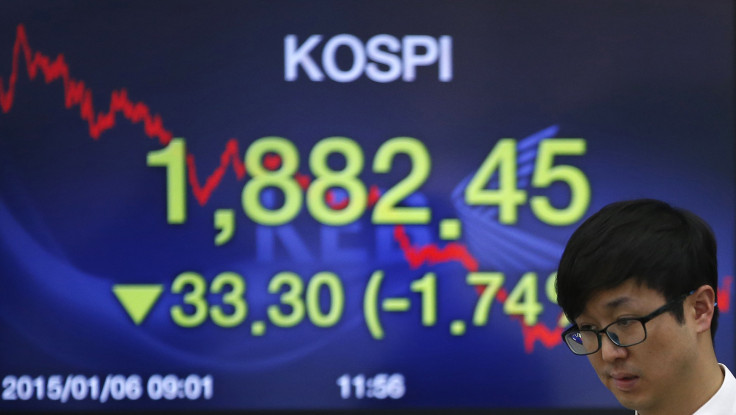Asian Shares Rise As South Korea Cuts Rates

(Reuters) - A surprise interest rate cut by South Korea's central bank on Thursday helped lift an index of Asian stocks away from the previous session's seven-week lows, while the prospect of higher U.S. interest rates buoyed the dollar.
The Bank of Korea's monetary policy committee cut its base rate by 25 basis points to a record low of 1.75 percent, its first cut in five months. It joined its counterparts in other countries which have recently taken advantage of lower inflation to ease monetary policy to spur sluggish growth.
"We think the two key drivers behind today's decision are a weaker economic outlook and deflation pressures," said Ronald Man, an economist at HSBC in Hong Kong, who expects a further 25 basis point rate reduction in the third quarter of 2015.
The Bank of Thailand cut its policy interest rate on Wednesday, also a surprise step, andIndia has cut rates twice this year. China has eased policy twice, with more moves expected, while Singapore, Australia and Indonesia have also eased.
MSCI's broadest index of Asia-Pacific shares outside Japan was up 0.3 percent, moving away from Wednesday's seven-week lows. The Korea Composite Stock Price Index (KOSPI) added 0.4 percent.
Japan's Nikkei extended early gains and rose 0.9 percent, bolstered by hopes of buying from public investors such as the government's pension fund.
Surprisingly strong U.S. employment data published last Friday fuelled expectations that the Federal Reserve may raise interest rates as soon as June, though some investors and analysts fear the economy is not yet ready for even marginally higher borrowing costs.
In contrast, the European Central Bank started this week to implement the 1 trillion euro bond buying program unveiled in January. The monetary policy divergence prompted many market players to shift funds to higher-yielding U.S. dollar from euro.
The euro fell to a 12-year low of $1.0511 on Wednesday and was last at $1.0534, down about 0.1 percent on the day.
The common currency has fallen about 4.8 percent in the past five sessions - a pace of decline not seen even during the European debt crisis of 2011-12.
The dollar index, which tracks the U.S. currency against a basket of six major rivals, hit a 12-year high of 99.985 on Wednesday and was last at 99.802.
The sharp fall in the euro has boosted many euro zone shares, with major stock indexes inGermany, France and Italy all rising more than 2 percent on Wednesday.
In contrast, the dollar's strength undermined U.S. shares on concerns it would erode multinational companies' earnings. The S&P 500 Index fell 0.2 percent to a one-month low overnight.
The dollar's strength and the specter of higher U.S. rates also risks unsettling the many emerging markets that have benefited from investors seeking higher yielding investments.
Currencies such as the Turkish lira and the South African rand have fallen almost as much as the euro so far this month. The Brazilian real fell about twice as much as the euro.
"We should take note of the risk that emerging currencies could fall further. ... Some emerging countries are running current account deficits and their currencies falling would be negative for risk asset markets," Makoto Noji, senior strategist at SMBC Nikko said in report.
U.S. crude prices hit a one-month low of $47.33 per barrel on Wednesday after government data showed a U.S. oil inventory build last week, contrary to some expectations for a drawdown. It last stood at $48.20 a barrel, up about 0.1 percent on the day.
The European benchmark Brent also hit a one-month low, though it bounced back later on Wednesday and added 2 percent. It was last up abut 0.5 percent at $57.85 a barrel.
© Copyright IBTimes 2024. All rights reserved.











